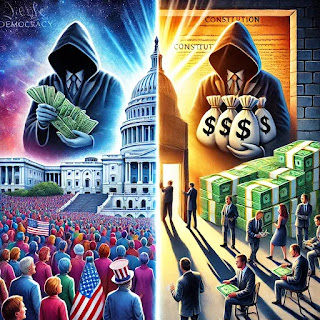By Bobby Darvish, Iranian-American Ex-Muslim, Former Vegan, Former Democrat, Former Socialist, Former CAIR-Columbus Executive Director, Former Muslim Forum of Utah President, Christian Conservative LDS
Critics of the United States frequently claim that our nation is an oligarchy—ruled by the wealthy elite to the detriment of ordinary citizens. As someone who once held leftist views, I understand why this idea resonates with many who feel alienated from the political process. However, as I transitioned from socialism to conservative principles grounded in faith and the Constitution, I came to see the flaws in this narrative. America is not an oligarchy, and the idea that it is ignores the reality of our constitutional framework, representative democracy, and the checks and balances built into our system.
Misunderstanding Oligarchy
An oligarchy is defined as a system of governance where a small group of individuals—often those with wealth, familial connections, or military power—controls the state. This is not the case in the United States. Unlike true oligarchies, such as the kleptocracies seen in Russia or some Middle Eastern regimes, the U.S. operates under a constitutional republic that guarantees rights and representation for its citizens.
While some wealthy individuals wield significant influence, this does not equate to direct governance. The presence of billionaires in politics or industry does not mean they hold unchecked power over government policies or citizen freedoms.
America's Constitutional Framework
The U.S. Constitution ensures that power is dispersed across the executive, legislative, and judicial branches of government. It establishes mechanisms such as elections, judicial review, and federalism to prevent any single group from monopolizing authority. Wealth may amplify one's voice in politics, but it cannot override the rule of law or the checks and balances that define our system.
The Constitution also protects freedoms such as speech, religion, and the right to bear arms—rights that oligarchies suppress to maintain their power. These freedoms allow Americans to challenge authority, advocate for change, and ensure accountability, something unimaginable in true oligarchic systems.
Elections and Political Participation
In an oligarchy, elections are typically meaningless or manipulated to maintain the status quo. In America, elections are open, competitive, and serve as a direct means for citizens to influence governance. Billionaires like Donald Trump or Michael Bloomberg can spend millions on campaigns, but they still require public support to win. Trump, for instance, succeeded because his policies resonated with millions of ordinary Americans, not because of his wealth alone.
Moreover, grassroots movements have proven time and again that money cannot guarantee political success. Bernie Sanders' campaigns, for instance, drew significant momentum despite being vastly outspent by his opponents. Similarly, conservative movements like the Tea Party demonstrated that ordinary Americans could shape national politics without relying on elite funding.
The Role of Wealth in Politics
Critics often point to campaign financing as evidence of oligarchy, but this argument overlooks the role of individual voters. Wealth can amplify a candidate's message, but it cannot guarantee votes. Furthermore, campaign finance laws require transparency, allowing the public to scrutinize political donations and hold candidates accountable.
Organizations like the Federal Election Commission (FEC) and watchdog groups ensure compliance with these laws. This transparency undermines the argument that wealthy individuals or corporations control the political process behind closed doors.
A Free Market, Not an Oligarchic Economy
America's capitalist system is often conflated with oligarchy, but this is a fundamental misunderstanding. In a free-market economy, success is determined by innovation, competition, and consumer choice, not by centralized control. Unlike oligarchic economies where wealth is concentrated among a few families or entities, the U.S. has a dynamic and diverse economic landscape that allows individuals from all backgrounds to succeed.
For example, figures like Elon Musk, who emigrated from South Africa, and Daymond John, the son of working-class parents, built their wealth through entrepreneurship, not inheritance or government favoritism. This economic mobility is antithetical to the stagnation characteristic of oligarchies.
The Danger of Believing the Myth
Believing that America is an oligarchy breeds cynicism and apathy, discouraging citizens from participating in the political process. It also distracts from the real threats to our freedoms, such as encroachments on free speech, excessive government regulation, and the erosion of moral values.
As a Christian conservative, I believe our nation’s strength lies in its adherence to principles of liberty, responsibility, and faith. Claiming that America is an oligarchy undermines these principles and gives undue credit to those who wish to centralize power under the guise of fighting inequality.
Conclusion
America is not an oligarchy. While wealth plays a role in politics, it does not dominate our system or define our governance. Our constitutional republic ensures representation, accountability, and the protection of individual freedoms. It is up to us, the citizens, to remain engaged, informed, and committed to preserving these principles.
Rather than succumbing to the falsehood that America is ruled by the rich, we must recognize the power we hold as voters, believers, and patriots. Through faith, hard work, and unity, we can ensure that our nation remains a beacon of liberty and justice for all.
Citations
- Federal Election Commission, “Campaign Finance Data.” https://www.fec.gov/data/
- U.S. Constitution, Articles I-III, and Amendments I, II, and X.
- Alexis de Tocqueville, Democracy in America, 1835.
- Pew Research Center, “Voter Turnout in U.S. Elections.” https://www.pewresearch.org/
- Thomas Sowell, Basic Economics: A Common Sense Guide to the Economy, 5th Edition.
- Federalist Papers No. 10, James Madison.
- Heritage Foundation, “The Economic Mobility Index.” https://www.heritage.org/


No comments:
Post a Comment